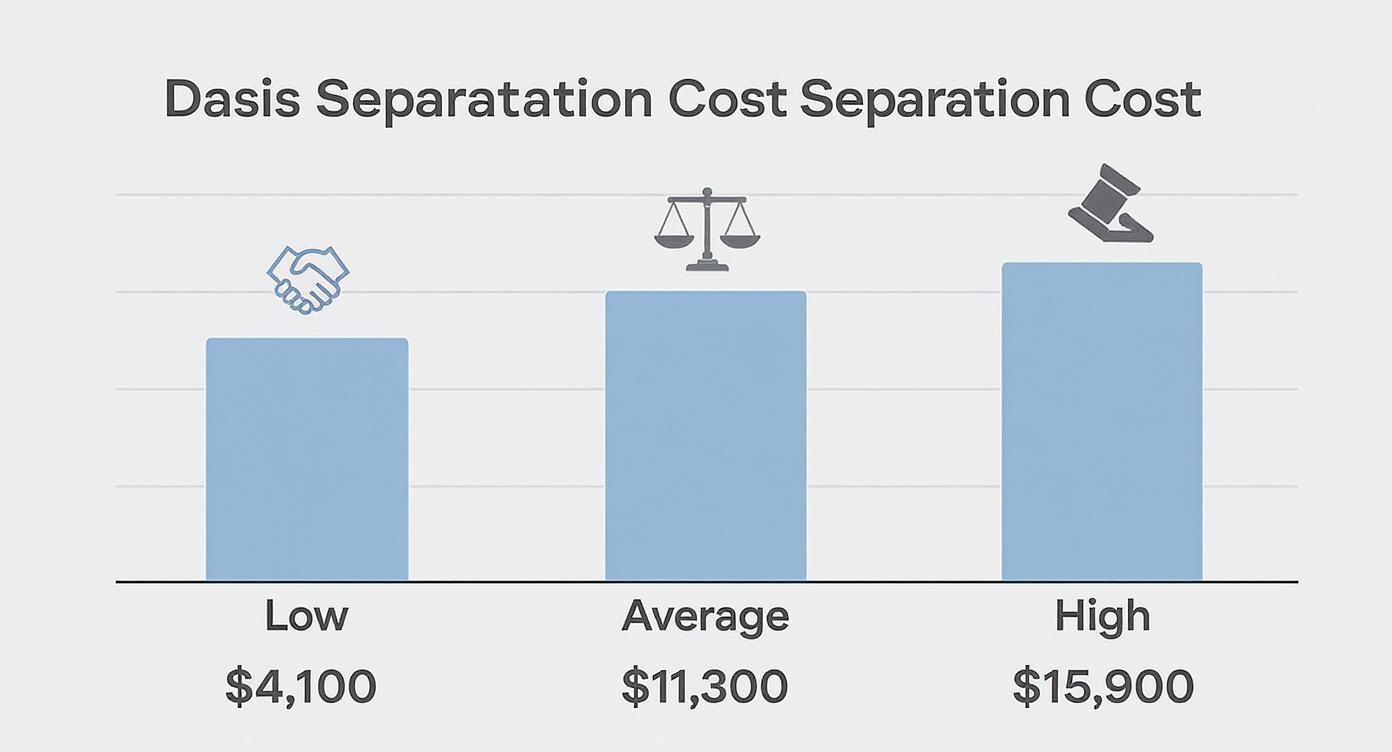When your family is going through a major shift, and your children’s future feels uncertain, the last thing you need is financial stress piling on top of the emotional weight. Understanding your rights and options matters most right now. In Texas, the cost of a legal separation isn't a single number but a spectrum that depends entirely on your family's unique circumstances. The path you choose—whether it’s a friendly agreement or a contentious dispute—will be the single biggest factor driving the final price tag.
Understanding the Financial Reality of a Separation
As you’re trying to map out a new future for your family, uncertainty about money can be overwhelming. While Texas doesn't have a formal court process called "legal separation," it offers powerful legal tools that accomplish the same goals, such as temporary orders filed during a divorce. These court orders establish the ground rules for property, finances, and most importantly, your children while you are living apart.
Thinking about the cost is a lot like planning a home renovation. A simple, cooperative agreement where both parents are on the same page is like a fresh coat of paint—relatively quick and affordable. But a complex case tangled with disputes over assets and a detailed possession schedule? That's more like a full structural remodel, requiring a lot more time, resources, and professional guidance.
The National Cost Spectrum
Across the country, the average cost for a legal separation or divorce in 2025 hovers around $11,300. For uncontested cases with minimal conflict, costs can be as low as $4,100. On the flip side, cases involving heated custody battles can easily climb to $15,900 or more. That wide range shows just how different every family's situation is.
The chart below gives you a visual breakdown of the typical cost ranges you might see, from amicable resolutions all the way to more complex legal fights.

As you can see, cooperation has a direct impact on your bottom line. The more you and your co-parent can agree on upfront, the more affordable the whole process becomes for your family.
Key Factors Influencing Your Costs
Several key elements will shape the final financial picture of your separation. Getting a handle on these variables gives you more control over the process. A huge piece of this is navigating shared assets and debts, like figuring out the tricky details of a mortgage assumption during a divorce.
Your primary cost drivers will almost always include:
- Level of Agreement: An uncontested case, where you and your spouse agree on all the major issues, will always be cheaper than a contested one that has to be settled by a judge.
- Child Custody Disputes: Your children's well-being is the top priority. In Texas, decisions about joint managing conservatorship (where both parents share rights and duties) and creating a possession schedule (the visitation calendar) are guided by the "best interests of the child" standard under the Texas Family Code. This legal standard requires a judge to prioritize the child’s emotional and physical well-being above all else.
- Complexity of Assets: Splitting a simple savings account is one thing. Untangling business ownership, retirement accounts, or multiple properties requires much more legal and financial heavy lifting.
To help you get a clearer picture, this table provides a high-level estimate of potential costs for different separation scenarios. It's designed to help families anticipate the kinds of expenses they might face.
Estimated Cost Breakdown for Separation Actions in Texas
| Expense Category | Uncontested/Amicable Scenario (Low End) | Contested/Complex Scenario (High End) |
|---|---|---|
| Attorney's Fees | $3,000 – $6,000 | $10,000 – $25,000+ |
| Court Filing Fees | $300 – $500 | $300 – $500 |
| Mediation Costs | $500 – $1,500 (if needed) | $2,000 – $5,000+ (multiple sessions) |
| Expert Fees | $0 (typically not needed) | $2,500 – $10,000+ |
| Miscellaneous Costs | $100 – $300 | $500 – $1,500+ |
| Estimated Total | $3,900 – $8,300 | $15,300 – $42,000+ |
Remember, these numbers are just estimates. Every family's situation is unique, and your final costs will depend on the specifics of your case. The more you and your co-parent can agree on outside of court, the more you can control these expenses and keep them on the lower end of the spectrum.
Demystifying the Role of Attorney Fees
Let's be honest: for most families in Texas, the biggest chunk of the cost of a legal separation will come from attorney fees. But before you get sticker shock, it’s important to understand how these fees work. This isn’t about hidden costs or confusing legal bills; it's about finding the right advocate who can guide your family toward a new, positive chapter.
Think of your attorney's fees as the engine that drives your case forward. They cover the time, expertise, and resources your lawyer dedicates to protecting your rights and your child's best interests. This includes everything from drafting the right legal documents to representing you in tense negotiations or even in court.

Understanding How Attorneys Bill for Their Time
Most family law attorneys in Texas work with one of two fee structures: hourly billing and retainers. It’s pretty straightforward once you break it down.
The most common setup is a retainer fee. Think of it as a down payment for legal services. You pay a lump sum upfront, which your attorney places into a trust account. As they get to work on your case—making phone calls, drafting motions, or preparing for hearings—they bill their time against that fund.
You’re essentially pre-paying for your attorney's time and expertise. This ensures they can start protecting your rights immediately, which is crucial in the early stages. It’s an investment in getting your case started on the right foot.
The hourly rate is simply what your attorney charges for each hour of work. This rate can vary quite a bit, depending on a lawyer's experience, reputation, and even their location within Texas. But remember, a higher hourly rate doesn't automatically mean a higher final bill. An experienced attorney might resolve your case more efficiently, which could save you a significant amount of money in the long run.
The Impact of Conflict on Your Legal Costs
Here’s the biggest variable in the equation: the level of cooperation between you and your co-parent. It directly impacts your bottom line.
Attorney fees for simple, uncontested cases average around $4,100. But if the case goes all the way to trial? That number can jump to an average of $17,700. The good news is that over 80% of cases are settled through mutual agreement, helping families avoid the massive costs of a full-blown court battle. If you're interested in how cooperation influences outcomes, you can discover more insights about divorce resolutions.
Questions to Ask During Your Consultation
To make sure you find the right fit for your family and avoid any financial surprises, you need to ask the right questions. Here are a few practical ones every parent should bring to a consultation:
- What is your hourly rate? What are the rates for paralegals or other staff who might work on my case?
- What is your initial retainer fee, and what exactly does it cover?
- Are there specific situations where I might need to replenish the retainer?
- How will you keep me in the loop about billing and the status of my retainer?
Asking these questions upfront empowers you to make an informed decision. It helps you find an advocate who not only respects your budget but truly prioritizes your family’s needs.
Navigating Court Costs and Other Essential Expenses
Beyond your lawyer's invoice, a few other essential costs are part of the process for any family law case in Texas. These aren't fees that go to your attorney; they're paid directly to the court or to third-party professionals whose services are needed to move your case forward.
Knowing about these expenses upfront helps you build a complete financial picture, so there are no surprises down the road. They are a standard part of nearly every case filed in the Texas family courts.
Mandatory Case Expenses
Think of these as the administrative costs required to get your case officially started and moving through the legal system. You can't really avoid them.
The most common mandatory costs include:
- Court Filing Fees: This is the fee you pay to the county clerk just to open your case file. It typically ranges from $300 to $500, depending on which Texas county you're in.
- Process Server Fees: After filing, your spouse has to be formally notified with official legal documents. A professional process server or a sheriff's deputy usually handles this service, and their fee can range from $75 to $150.
Potential and Situational Costs
Depending on your family’s unique circumstances, other expenses might pop up. Not every case needs these, but it’s smart to know they exist. These costs often come into play when there are disagreements or complex issues that need an expert opinion to help the judge make a fair decision.
A judge’s primary duty is to act in the "best interests of the child." Sometimes, they need impartial, expert input to understand what that looks like for your family, which is where these professionals come in.
Here are a few potential third-party costs you might encounter:
- Mandatory Parenting Classes: Many Texas judges require parents in a custody dispute to take a co-parenting class. These courses usually cost between $25 and $75 and are designed to help you and your co-parent support your children through the transition.
- Property Appraisers: If you and your spouse own a home or other significant property and can’t agree on what it's worth, the court may require a professional appraisal to get a neutral, expert valuation.
- Child Custody Evaluators: In highly contested custody cases, a judge might appoint a neutral expert to conduct a thorough evaluation. They'll provide a recommendation on the best possession schedule, but this process is intensive and can be a significant expense.
- Financial Experts: When you're dividing complicated assets like a business, stock options, or investments, a forensic accountant may be needed to ensure everything is valued accurately and divided fairly.
These costs also play a role in managing financial obligations like child support. For more information on how those payments are handled, you can learn about the Texas Child Support Disbursement Unit and its function in the process.
How Your Family's Situation Shapes the Final Price Tag
Ever seen a huge price range for something and wondered, "Why the big difference?" The cost of a legal separation works the same way. The reason it varies so much is simple: no two families are exactly alike. The final bill is a direct reflection of your unique circumstances, especially how well you and your co-parent can work together.
Think of it like this: an uncontested separation is a lot like a smooth business negotiation. Both parents come to the table, already agree on the big stuff, and work together to iron out the details. This path is much quicker and requires fewer professional hours, making it the most affordable route by far.
A contested case, on the other hand, is where things get complicated and expensive. When you can’t agree on property, money, or the kids, it takes a lot more time, legal heavy lifting, and emotional energy to get to the finish line. That friction is what drives up the cost.
The Impact of Contested vs. Uncontested Cases
The single biggest factor that will determine your total expense is conflict. An amicable, uncontested separation—where you both agree on everything from dividing the furniture to setting up a possession schedule—will always be the cheapest way to go. It cuts down on attorney hours and keeps the process moving forward without expensive delays.
A contested separation, however, can get pricey, fast. Every single point of disagreement needs more time for negotiation, mediation, or even court hearings to resolve. This is particularly true for fights over child custody, where everything is decided based on the "best interests of the child" standard here in Texas.
Key Variables That Influence Your Costs
Beyond just the level of conflict, a few other key factors will shape the final price of your separation. Knowing what these are ahead of time can help you anticipate expenses and make smarter decisions.
- Complexity of Your Marital Estate: Splitting a simple savings account is one thing. But untangling more complex assets like a family business, retirement accounts, or multiple real estate properties requires a ton of detailed legal and financial work.
- Child Custody and Support Disputes: If you and your co-parent can't agree on a joint managing conservatorship (shared parental rights) or a possession schedule, you're likely headed for mediation or court, which adds to the bill. The same goes for child support—and if circumstances change down the road, you might need to learn how to modify child support in Texas.
- Shared Property and Debts: A huge piece of this process is figuring out how to divide what you own and what you owe. For most families, that means dealing with shared property. You may even need some guidance on transferring a mortgage after divorce to make sure the transition is clean and the financial lines are clearly drawn.
Ultimately, cooperation is the most powerful tool you have for managing legal costs. Finding common ground not only protects your finances but, more importantly, shields your children from unnecessary conflict and stress. Your shared focus on their well-being can pave the way for a more peaceful and affordable resolution.
Actionable Strategies to Reduce Your Separation Costs
When you’re facing a separation, it’s easy to feel like you’re losing control—over your finances, your family’s future, pretty much everything. But here's the thing: you have far more influence over the final bill for your legal separation than you probably realize. By taking a few practical, intentional steps as a parent, you can keep expenses from spiraling while still protecting what matters most.
Working as a team with your attorney is the single best way to keep costs in check. One of the simplest yet most effective things you can do? Come prepared. Before you even walk into that first meeting, gather up all your important financial documents—bank statements, tax returns, property deeds, the works. This simple act of preparation saves your attorney a ton of time, and their time is your money.

Embrace Cooperative Solutions
The biggest driver of legal costs is conflict. While some disagreements are bound to happen, choosing cooperation over confrontation can slash your expenses dramatically. This is where alternative dispute resolution methods, especially mediation, really shine.
Mediation isn't about one person winning and the other losing. Think of it as a guided conversation with a neutral third-party professional—the mediator—whose entire job is to help you and your co-parent find common ground. You get to reach agreements that are in the best interest of your children without a drawn-out, expensive court battle. Not only is this approach cheaper, but it also helps build a more positive foundation for co-parenting down the road.
Remember, the goal isn't just to end one chapter. It's about starting the next one on the best possible terms, especially for your children. Mediation empowers you to craft solutions that actually work for your family, rather than leaving those critical decisions in a judge's hands.
Communicate Efficiently and Effectively
Clear, organized communication with your legal team is non-negotiable for saving money. You can make the whole process more efficient by being strategic. Instead of firing off five short emails with random questions as they pop into your head, try compiling them into one detailed message. This allows your attorney to address everything at once, which saves you a surprising amount of billable time.
It's also encouraging to know that most families find a way to work together. In fact, only about 5% of divorces are ultimately decided in a courtroom. The vast majority—a full 95%—settle through either mediation or just coming to a mutual agreement on their own. That statistic is a powerful testament to how cooperation can reduce both financial and emotional costs. You can discover more about divorce statistics to see just how common these cooperative outcomes are.
By focusing on these real-world strategies, you can take charge of the process and protect your family's future.
Key Takeaways: Planning Your Next Steps with Confidence
Navigating a separation can feel like trying to find your way through a fog, especially when it comes to the financial side. The cost of a legal separation in Texas isn’t a fixed price tag; it’s a direct reflection of your family’s unique journey. By understanding the factors that shape these expenses, you can move from a place of uncertainty to one of empowerment.
It's easy to feel like the costs are out of your control, but you hold more power than you might think. Being prepared and organized saves your attorney valuable time, which directly saves you money. More importantly, choosing cooperation over conflict whenever possible is the single most effective way to protect both your financial and emotional resources.
Your Action Plan for Moving Forward
This journey is about moving forward, not just closing a chapter. Whether you are creating a temporary arrangement or considering the next steps toward divorce, the core principles stay the same. In fact, the process for a separation agreement is quite similar to learning how to file for divorce in Texas, as both require careful planning and a clear understanding of your rights.
Your path forward can be built on these key takeaways:
- Cooperation is Your Greatest Cost-Saving Tool: Working with your co-parent to find common ground minimizes the need for lengthy and expensive legal battles.
- Attorney Fees Are the Primary Expense: Efficient communication and solid preparation will help you make the most of your legal investment.
- Preparation is Power: Gathering financial documents and having clear goals before you start the process creates a smoother, more cost-effective path.
Your main goal here is to build a stable, secure future for yourself and your children. While the legal process can be intimidating, remember that every step you take is a move toward clarity and a new beginning for your family.
Validating your concerns while focusing on real, actionable solutions is how you get there. You absolutely have the ability to make informed decisions that honor both your emotional well-being and your financial stability.
Common Questions About Separation Costs in Texas
When you're staring down a major family change, the questions can feel endless. Getting clear, straightforward answers is the first step toward feeling like you're back in the driver's seat. Below, we’ve tackled some of the most common questions Texas parents ask about the financial side of a separation.
Our goal is to give you solid legal information in plain English, helping you feel more prepared for whatever comes next.
Is It Cheaper to Separate Than to Divorce?
Not always. It’s a common misconception, but the legal steps for creating a separation agreement (through what’s called temporary orders) and finalizing a divorce are often identical. You're still dividing property, creating a custody plan for your children, and figuring out support.
The real driver of legal separation costs isn't the legal label—it's the level of conflict. An amicable divorce where everyone agrees can be thousands of dollars cheaper than a dragged-out, highly contested separation.
Can We Handle a Separation Without Lawyers to Save Money?
While it sounds like an easy way to cut costs, going it alone is a huge gamble for your family's future. Without a legal professional in your corner, you could easily agree to unfair terms or completely miss critical details about your property rights or your rights as a parent.
An experienced family law attorney does more than just fill out forms. They’re your advocate, making sure every agreement follows the Texas Family Code and protects your children from costly mistakes that could require expensive legal battles to fix later on.
What if My Spouse Won't Disclose Their Financial Information?
In any Texas divorce or separation, full financial transparency isn’t just good faith—it's the law. If your spouse is hiding assets or refusing to hand over documents, your attorney has legal tools to compel them. This includes discovery requests, subpoenas, and depositions to get the full picture.
Yes, forcing the issue can add to your legal fees, but it's absolutely essential for getting a fair and just division of your community property. Protecting your financial future is an investment worth making for you and your children.
If you need help with a child custody or visitation case in Texas, our experienced attorneys can guide you every step of the way. Contact The Law Office of Bryan Fagan, PLLC today for a free consultation.

